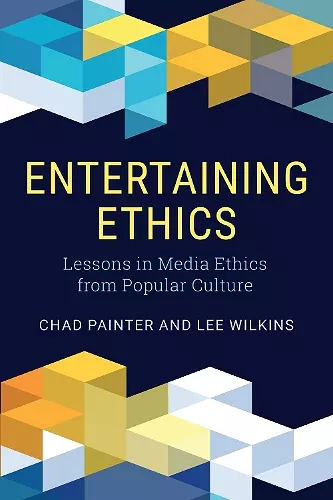Entertaining Ethics
Lessons in Media Ethics from Popular Culture
Lee Wilkins author Chad Painter author
Format:Paperback
Publisher:Bloomsbury Publishing PLC
Published:11th Mar '21
Currently unavailable, and unfortunately no date known when it will be back

This book offers a creative exploration of ethical theory, analyzing key concepts such as truth-telling and social justice through popular films and media, serving as a valuable companion to Media Ethics: Issues and Cases.
Entertaining Ethics offers a unique and engaging perspective on ethical theory by exploring fundamental concepts such as truth-telling, loyalty, privacy, public service, media economics, social justice, advocacy, and accountability. The author skillfully weaves these themes into discussions centered around popular films, television shows, and music, making complex ethical issues more relatable and accessible to readers. This imaginative approach not only captures the reader's interest but also encourages them to think critically about the ethical dimensions of the media they consume.
By utilizing familiar cultural references, the book allows readers to connect theoretical concepts with real-world scenarios. This method helps to demystify ethical discussions, showing how these principles manifest in everyday life and popular culture. Whether it's analyzing a character's moral dilemma in a film or evaluating the ethical implications of a news story, Entertaining Ethics invites readers to reflect on their own values and the societal norms that shape them.
Additionally, this book serves as an excellent companion to Media Ethics: Issues and Cases, providing further insights and context for those studying media ethics. It encourages a deeper understanding of how ethics play a crucial role in the media landscape, highlighting the responsibilities of creators and consumers alike. Overall, Entertaining Ethics is a thought-provoking exploration of morality that resonates with anyone interested in the intersection of media and ethics.
Painter and Wilkins seamlessly blend engaging analyses of popular cultural artifacts with accessible summaries of philosophical principles to depict the competing interests—including truth-telling, loyalty, privacy, public service, and the profit motive—that confront media professionals in making ethical decisions…. The authors memorably trace the phrase public service from an early use in 1576 to the normative roles of journalism displayed in the TV shows Adventures of Superman (1952–58) and House of Cards (2013–18) and the films All the President's Men (1976) and Contagion (2011) to document the profession's evolving values in the 20th and 21st centuries. This timely book samples popular culture and theoretical scholarship without short shrifting either. It includes discussion questions throughout and a conclusion full of fruitful questions for further research. Highly recommended. Undergraduates through faculty. * Choice Reviews *
An exciting read from Star Trek to Madame Secretary. The beauty of this book is that it addresses overarching themes and topics that are relevant to journalism and mass communication and then views it through the lens of popular culture, supporting the analysis through philosophy. -- Michael T. Martinez, University of Tennessee
An intelligent, well-written text that can capture students’ attention through the use of popular culture while balancing readability with an appropriate depth of analysis. -- Ben Mulvey, Associate Professor of Philosophy, Nova Southestern University
This book offers a fresh take on entertainment ethics, especially the depiction of journalists in popular culture. It integrates ethics theory with excerpted dialogue from several movies and TV shows. Students can learn much about the history of how journalists are viewed and how it supports or refutes journalists' real experiences. -- Judith Sylvester, Ph.D. Manship School of Mass Communication, LSU
Painter and Wilkins offer an engaging analysis of entertainment media for insights into competing interests that confront media practitioners today. Abundant discussion questions make good use of contemporary debate about social justice and privacy rights, among many others, to show how pop culture entertainments free us to imagine valid decision-making in the real world. Graduate and upper-division students planning careers in public relations, strategic communications, or reporting will benefit from this consistently accessible blend of normative ethics theory and pop culture commentary. * Journalism and Mass Communication Educator *
ISBN: 9781538138205
Dimensions: 231mm x 154mm x 11mm
Weight: 281g
198 pages